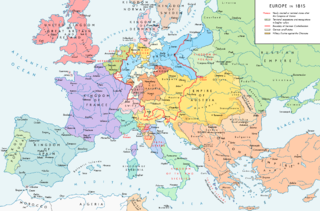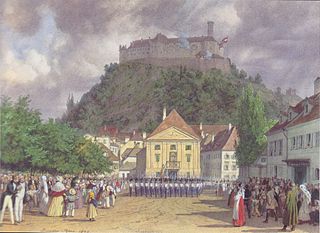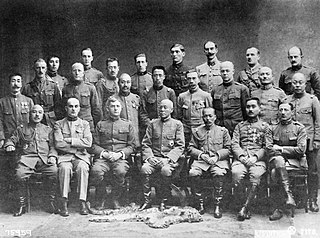
The Molotov–Ribbentrop Pact was a non-aggression pact between Nazi Germany and the Soviet Union that enabled those two powers to partition Poland between them. The pact was signed in Moscow on 23 August 1939 by German Foreign Minister Joachim von Ribbentrop and Soviet Foreign Minister Vyacheslav Molotov and was officially known as the Treaty of Non-Aggression between Germany and the Union of Soviet Socialist Republics. Unofficially it has also been referred to as the Hitler–Stalin Pact, Nazi–Soviet Pact or Nazi–Soviet Alliance.

The Treaty of Shimonoseki, also known as Treaty of Maguan in China and Treaty of Bakan in the period before and during WWII in Japan, was a treaty signed at the Shunpanrō hotel (春帆樓), Shimonoseki, Japan on 17 April 1895, between the Empire of Japan and Qing China, ending the First Sino-Japanese War. The peace conference took place from 20 March to 17 April 1895. This treaty followed and superseded the Sino-Japanese Friendship and Trade Treaty of 1871.

The Concert of Europe refers to a general consensus among the Great Powers of 19th Century Europe to maintain the European balance of power and the integrity of territorial boundaries. Never a consensus, and subject to disputes and jockeying for position and influence, the Concert represents an extended period of relative peace and stability in Europe following the Wars of the French Revolution and Napoleonic Wars which had consumed the continent since the 1790s. It is typically divided into two phases with different dynamics.

The Congress of Laibach was a conference of the allied sovereigns or their representatives, held in 1821 as part of the Congress System which was the decided attempt of the five Great Powers to settle international problems after the Napoleonic Wars through discussion and collective weight rather than on the battlefield. A result of the Congress was the authorization of Austrian intervention in the Kingdom of the Two Sicilies in order to quell a liberal uprising.

The Boxer Protocol was signed on September 7, 1901, between the Qing Empire of China and the Eight-Nation Alliance that had provided military forces, after China's defeat in the intervention to put down the Boxer Rebellion. It is often regarded as one of the Unequal Treaties.

The Treaty of Constantinople was the product of the London Conference of 1832 which opened in February 1832 with the participation of the Great Powers on the one hand and the Ottoman Empire on the other. The factors which shaped the treaty included the refusal of Leopold of Saxe-Coburg-Gotha to assume the Greek throne. He was not at all satisfied with the Aspropotamos–Spercheios line, which replaced the more favorable Arta–Volos line considered by the Great Powers earlier.
Allied intervention in the Russian Civil War consisted of a series of multi-national military expeditions which began in 1918. The Allies first had the goal of helping the Czechoslovak Legion in securing supplies of munitions and armaments in Russian ports. At times between 1918 and 1920 the Czechoslovak Legion controlled the entire Trans-Siberian Railway and several major cities in Siberia. By 1919 the goal was to help the White forces in the Russian Civil War. When the Whites collapsed the forces were withdrawn by 1920. The Soviet government until its collapse in 1991 made the episode a feature of its anti-Western propaganda.

The 1838 Treaty of Balta Liman, or the Anglo-Ottoman Treaty, is a formal trade agreement signed between the Sublime Porte of the Ottoman Empire and Great Britain. The trade policies imposed upon the Ottoman Empire, after the Treaty of Balta Liman, were some of the most liberal, open market, settlements that had ever been enacted during the time. The terms of the treaty stated that, the Ottoman Empire will abolish all monopolies, allow British merchants and their collaborators to have full access to all Ottoman markets and will be taxed equally to local merchants. These agreements did not constitute an equal free trade arrangement, as the United Kingdom still employed protectionist policies on their agricultural markets.

The Siberian intervention or Siberian expedition of 1918–1922 was the dispatch of troops of the Entente powers to the Russian Maritime Provinces as part of a larger effort by the western powers, Japan and China to support White Russian forces and the Czechoslovak Legion against Soviet Russia and its allies during the Russian Civil War. The Imperial Japanese Army continued to occupy Siberia even after other Allied forces withdrew in 1920.

During the Spanish Civil War, several countries followed a principle of non-intervention to avoid any potential escalation or possible expansion of the war to other states. That would result in the signing of the Non-Intervention Agreement in August 1936 and the setting up of the Non-Intervention Committee, which first met in September. Primarily arranged by the French and the British governments, the Committee also included the Soviet Union, Fascist Italy, and Nazi Germany. Ultimately, the committee had the support of 27 states.

The Alma-Ata Protocols were the founding declarations and principles of the Commonwealth of Independent States (CIS). The leaders of Russia, Ukraine, and Belarus had agreed to the Belovezha Accords on 8 December 1991, dissolving the Soviet Union and forming the CIS. On 21 December 1991, Armenia, Azerbaijan, Belarus, Kazakhstan, Kyrgyzstan, Moldova, Russia, Tajikistan, Turkmenistan, Ukraine, and Uzbekistan agreed to the Alma-Ata Protocols, joining the CIS. The latter agreement included the original three Belavezha signatories, as well as eight additional former Soviet republics. Georgia was the only former republic that did not participate while Lithuania, Latvia and Estonia refused to do so as according to their governments, the Baltic states were illegally incorporated into the USSR in 1940.

Relevant events began regarding the Baltic states and the Soviet Union when, following Bolshevist Russia's conflict with the Baltic states—Lithuania, Latvia and Estonia—several peace treaties were signed with Russia and its successor, the Soviet Union. In the late 1920s and early 1930s, the Soviet Union and all three Baltic States further signed non-aggression treaties. The Soviet Union also confirmed that it would adhere to the Kellogg–Briand Pact with regard to its neighbors, including Estonia and Latvia, and entered into a convention defining "aggression" that included all three Baltic countries.

The Venezuelan crisis of 1902–1903 was a naval blockade imposed against Venezuela by Great Britain, Germany and Italy from December 1902 to February 1903, after President Cipriano Castro refused to pay foreign debts and damages suffered by European citizens in recent Venezuelan civil wars. Castro assumed that the American Monroe Doctrine would see Washington intervene to prevent European military intervention. However, at the time, US president Theodore Roosevelt and his Department of State saw the doctrine as applying only to European seizure of territory, rather than intervention per se. With prior promises that no such seizure would occur, the US was officially neutral and allowed the action to go ahead without objection. The blockade saw Venezuela's small navy quickly disabled, but Castro refused to give in, and instead agreed in principle to submit some of the claims to international arbitration, which he had previously rejected. Germany initially objected to this, arguing that some claims should be accepted by Venezuela without arbitration.
The Règlement Organique was a series of international conventions, between 1860 and 1864, between the Ottoman Empire and the European Powers, which led to the creation of the Mount Lebanon Mutasarrifate.
The London Protocol of 3 February 1830 was an agreement between the three Great Powers, which amended the decisions of the 1829 protocol and established Greece as an independent, sovereign state.
The London Protocol of 22 March 1829 was an agreement between the three Great Powers, which amended the first London Protocol on the creation of an internally autonomous, but tributary Greek state under Ottoman suzerainty.
The London Protocol of 16 November 1828 was an agreement between the three Great Powers, which established the creation of an internally autonomous, but tributary Greek state under Ottoman suzerainty.

The Convention of Constantinople was signed between the Kingdom of Greece and the Ottoman Empire on 2 July 1881, resulting in the cession of the region of Thessaly and a part of southern Epirus to Greece.
The Protocol of St. Petersburg was an 1826 Anglo-Russian agreement for the settlement of the Greek War of Independence.

The Protocol on Ireland/Northern Ireland, commonly abbreviated to the Northern Ireland Protocol, is a protocol to the Brexit Withdrawal Agreement that governs the unique customs and immigration issues at the border in the island of Ireland between the United Kingdom of Great Britain and Northern Ireland and the European Union, and on some aspects of trade in goods between Northern Ireland and the rest of the United Kingdom. Its terms were negotiated in 2019 and agreed and concluded in December 2020. Due to the thirty-year internecine conflict in Northern Ireland, the UK-Ireland border has had a special status since that conflict was ended by the Belfast Agreement/Good Friday Agreement of 1998. As part of the Northern Ireland Peace Process, the border has been largely invisible, without any physical barrier or custom checks on its many crossing points; this arrangement was made possible by both countries' common membership of both the EU's Single Market and Customs Union and of their Common Travel Area.













